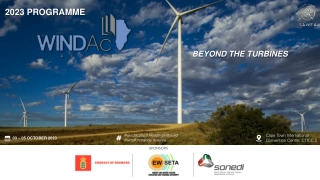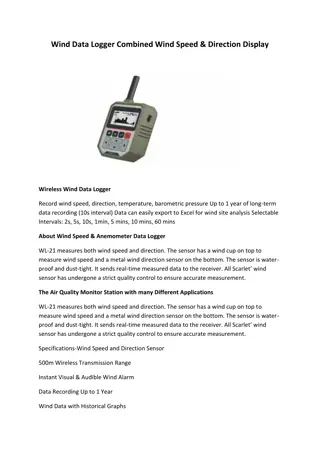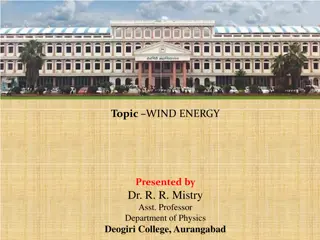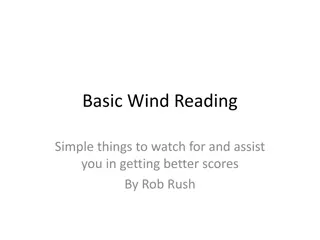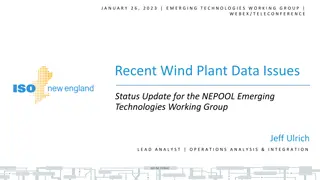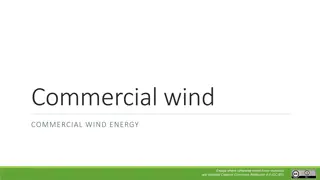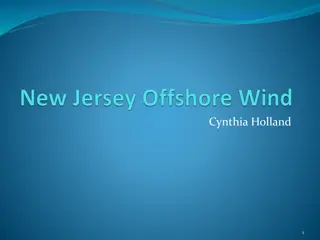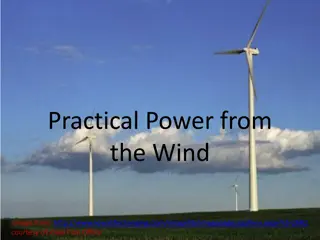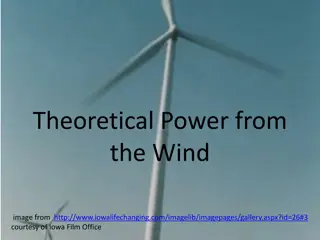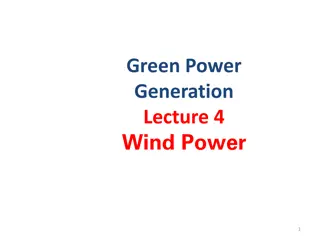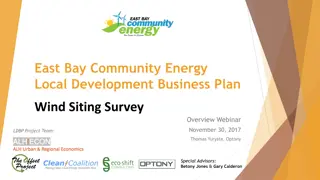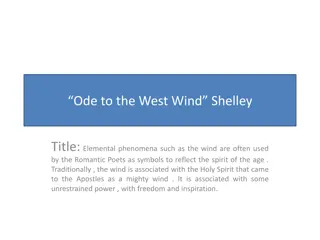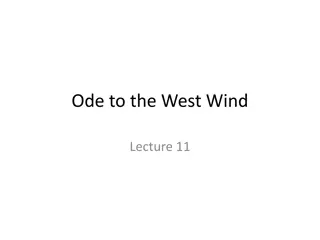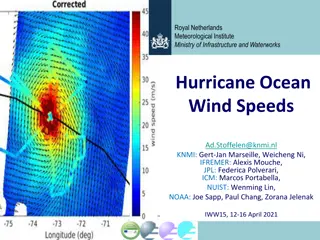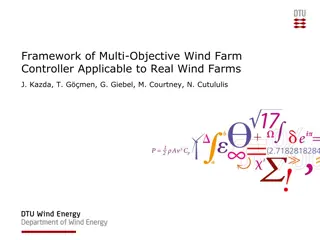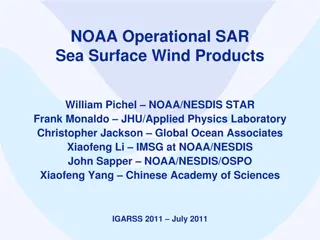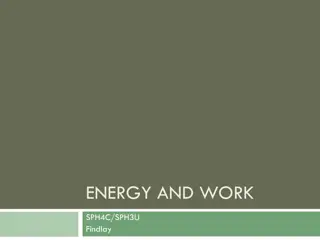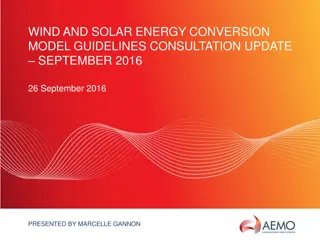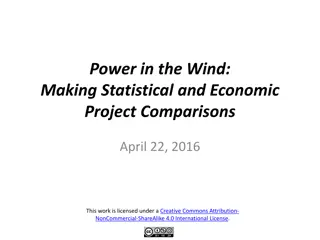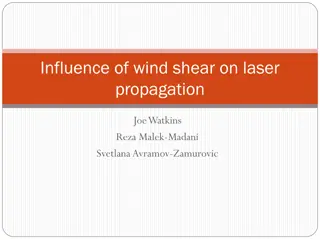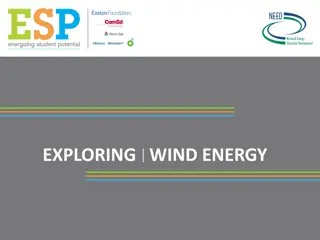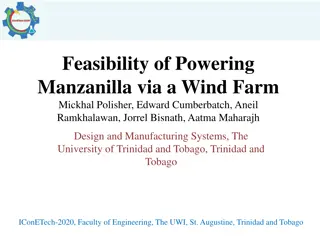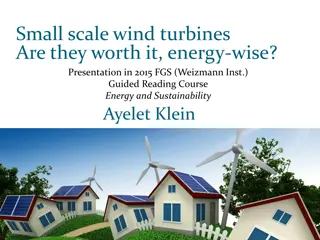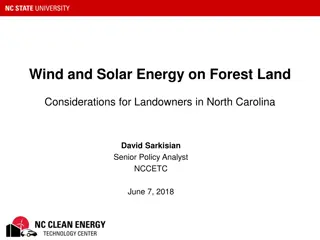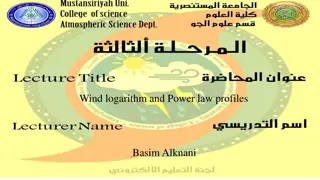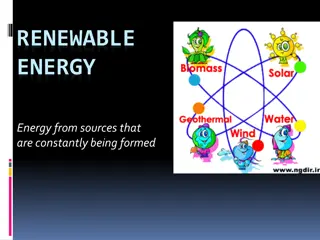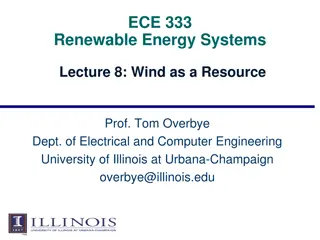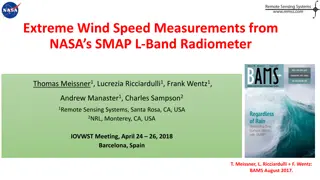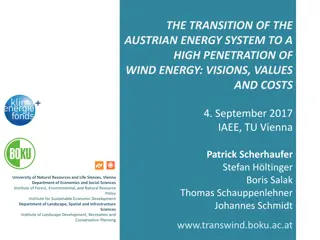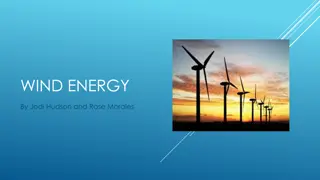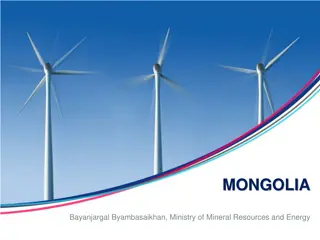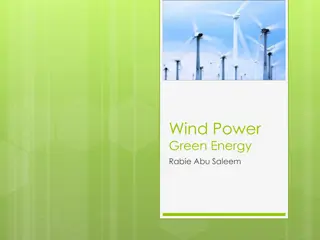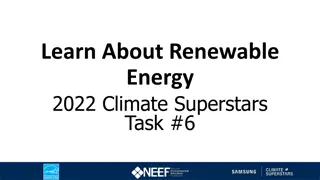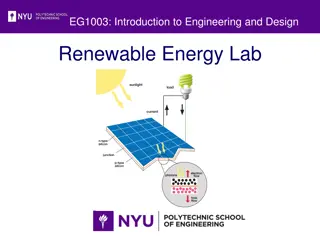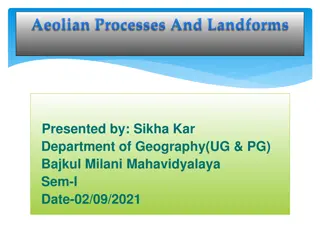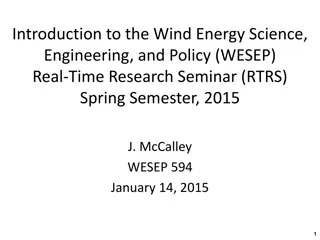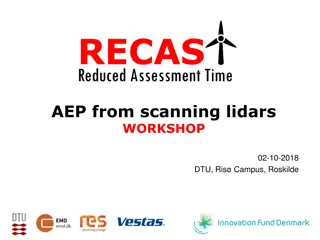Green Energy Market
Green energy also referred to as clean energy, is usually derived from natural sources that are constantly replenished. Solar energy, wind energy, hydroelectric power, biomass energy, geothermal energy, tidal energy, and wave energy are different types of renewable energy. Solar energy is the radian
6 views • 6 slides
WindAC 2023 Programme: Beyond the Turbines at CTICC, Cape Town
Explore the WindAC 2023 Programme focusing on advancements in wind energy, featuring expert presentations, paper sessions, and discussions on offshore wind, digital twin technology, open-source software, and more. Join industry leaders at CTICC from 2-5 October 2023 to delve into South Africa's wind
0 views • 5 slides
Wind Data Logger Combined Wind Speed & Direction Display
\nWireless Wind Data Logger\n\nRecord wind speed, direction, temperature, barometric pressure Up to 1 year of long-term data recording (10s interval) Data can easily export to Excel for wind site analysis Selectable Intervals: 2s, 5s, 10s, 1min, 5 mi
1 views • 2 slides
Exploring Wind Energy: Harnessing Nature's Power for a Sustainable Future
Wind energy, derived from the movement of air masses caused by solar heating, is a clean and renewable energy source. Wind turbines convert this kinetic energy into mechanical energy, offering a range of unit ratings from small to very large. Wind farms, consisting of turbines, generate electricity,
2 views • 19 slides
Wind Reading Essentials for Improved Accuracy in Shooting
Enhance your shooting skills by mastering wind reading basics such as wind speed, wind direction, flag patterns, and their effects on projectiles. Understand how to interpret wind conditions to make accurate shots and improve your scoring. Explore the key factors influencing the flight path of a pro
0 views • 10 slides
Wind Plant Telemetry and Web Services Issues Update
In early January 2023, certain wind plants experienced inaccuracies in their telemetry and web services data, impacting downstream processes. ISO Operating Procedure 14-F outlines requirements for wind plant telemetry, including Real Time High Operating Limit (RTHOL), Wind Plant Future Availability
0 views • 10 slides
Analysis of "Ode to the West Wind" by Percy Bysshe Shelley
Explore the imagery and symbolism in Percy Bysshe Shelley's "Ode to the West Wind." This romantic poem delves into themes of nature, change, and the power of the wind, captivating readers with its profound musings. Delve into the stanzas that illustrate the wind's dual role as both a destroyer and p
1 views • 10 slides
Commercial Wind Energy Basics
This content discusses the fundamental aspects of commercial wind energy, covering topics such as different types of wind turbines, their components, operational principles, and environmental considerations. It explores the distinction between Horizontal-axis wind turbines (HAWT) and Vertical-axis w
0 views • 16 slides
Advancements in New Jersey's Offshore Wind Energy Development
New Jersey has taken significant steps in the development of offshore wind energy, starting as early as 2007. Despite some initial setbacks, progress has been made with initiatives such as the Energy Master Plan and the signing of the Offshore Wind Economic Development Act. Governor Murphy's Executi
0 views • 5 slides
Insights into Wind Power Efficiency and Practical Applications
Exploring the practical and theoretical aspects of wind power, including the Betz Factor and Clipper Wind's actual power curve. Understanding how wind speed affects power output and the limitations of wind turbines in harnessing energy effectively.
0 views • 11 slides
Understanding Wind Power Generation Principles
Exploring the fundamental concepts of wind power generation, this content discusses the relationship between kinetic energy, air mass, and wind energy. It delves into the calculation of wind power using air density, velocity, and swept area, providing insights into how wind power efficiency varies w
0 views • 10 slides
Understanding Wind Power Generation and Wind Farms
Wind power generation involves the use of wind turbines to produce electric power, often in the form of wind farms consisting of multiple turbines. Factors such as wind speed, turbine siting, and altitude play crucial roles in maximizing power production. Wind farms can be located onshore or offshor
1 views • 60 slides
East Bay Community Energy Local Development Business Plan Wind Siting Survey Overview
The East Bay Community Energy's Wind Siting Survey conducted in November 2017 aimed to identify properties in Alameda County suitable for wind energy development. The survey assessed wind speed, hosting potential, and capacity factors, resulting in 110 MW capacity distributed across public and agric
0 views • 6 slides
Symbolism of the Wind in Shelley's "Ode to the West Wind
Elemental phenomena, like the wind, symbolize the spirit of the Romantic age in Shelley's "Ode to the West Wind." The poem portrays the west wind as a powerful force of nature, associated with freedom, inspiration, and the Holy Spirit. Through vivid imagery, Shelley explores the transformative and r
0 views • 7 slides
Green Energy Transition in Nigeria: Opportunities and Challenges
Nigeria faces challenges in meeting its energy demands, with a large population lacking access to reliable electricity. The transition to green energy sources like solar, biomass, hydro, and wind presents investment opportunities to address these issues. Solar energy potential is high in Nigeria, wh
1 views • 9 slides
The Influence of the West Wind on Nature: A Visual Journey
The poetic verses of "Ode to the West Wind" by Percy Bysshe Shelley vividly depict the disruptive and transformative impact of the West Wind on nature. Through captivating imagery, the poem portrays how the West Wind stirs the Mediterranean sea from its slumber, creates chasms in the Atlantic Ocean,
1 views • 20 slides
Challenges in Hurricane Wind Speed Calibration and Validation Metrics
Need for accurate extreme wind measurements is crucial for various applications like hurricane tracking, climate monitoring, and oceanography. This includes reliance on dropsondes for wind speed calibration, validation metrics using multiple methods, and challenges in integrating different sources o
0 views • 22 slides
Optimal Wind Farm Control Framework for Real Wind Farms
This research focuses on developing a framework for a multi-objective wind farm controller applicable to real wind farms. It addresses the significant power loss and increased fatigue loads caused by wake effects in wind farms. The objectives include composing solutions into a control framework, ide
0 views • 12 slides
NOAA SAR High-Resolution Coastal Winds Overview
NOAA's Operational SAR Sea Surface Wind Products provide detailed information on wind patterns derived from SAR images. The system aims to implement high-resolution wind production, capable of deriving winds from various SAR satellites. The operational goals include compatibility with international
0 views • 28 slides
Understanding Different Forms of Energy and Work in Physics
Energy in physics is the capacity to do work, and there are various forms of energy such as radiant energy, kinetic energy, gravitational potential energy, elastic potential energy, chemical potential energy, nuclear potential energy, electrical potential energy, thermal energy, and sound energy. Ea
0 views • 47 slides
Wind and Solar Energy Conversion Model Guidelines Consultation Update September 2016
Presented by Marcelle Gannon, this update covers the status of the consultation process, local limit and wind speed changes, extreme wind cut-out, possible power, estimated power proposal, and next steps. It provides insights into the current status of the consultation process, issues paper, draft r
0 views • 13 slides
Exploring Wind Power: Statistical and Economic Project Comparisons
Delve into the world of wind power with this informative content covering the origins of wind, effects of Earth's rotation on wind patterns, and the impact of elevation on wind speed. Learn about the calculations and units involved in wind energy analysis, providing a comprehensive overview of this
0 views • 32 slides
Experimental Study on Wind Shear Effects on Laser Propagation
Research conducted by Joe Watkins, Reza Malek-Madani, and Svetlana Avramov-Zamurovic to analyze the impact of wind shear on laser propagation. The experiments involved a HeNe red laser passing through a tunnel with varying wind speeds. Data on light intensities and wind influence were collected and
0 views • 7 slides
Exploring the Evolution of Wind Energy
Wind energy has a rich history dating back to ancient times, with significant developments leading to modern turbines. The use of wind power has grown steadily, contributing to clean and renewable energy goals globally. It offers numerous environmental and economic benefits, such as reducing emissio
0 views • 30 slides
Feasibility Study: Powering Manzanilla with a Wind Farm
A feasibility study by Mickhal Polisher and team from The University of Trinidad and Tobago explores the potential of powering the area of Manzanilla with a wind farm. The study aims to determine the power consumption of the area, assess the use of wind resources to meet demand, and evaluate the via
0 views • 19 slides
Assessment of Small-Scale Wind Turbines for Energy Efficiency
Explore the viability of small-scale wind turbines in terms of energy production efficiency. Delve into the history of wind turbine designs, types like HAWT and VAWT, power generation factors such as Betz limit and power curves, wind resources, turbulence effects, and comparisons of different turbin
0 views • 30 slides
Wind and Solar Energy Considerations for Forest Land in North Carolina
Exploring the potential of wind and solar energy on forested land in North Carolina, this article discusses the benefits and challenges of harnessing renewable energy in forested areas. Topics include the evolution of wind energy technology in forested regions, advantages, disadvantages, and the imp
0 views • 32 slides
Understanding Wind Profiles and Aerodynamic Roughness Length
Wind profiles are crucial in understanding how wind speed changes with height in the boundary layer. The logarithmic and power law profiles depict this relationship, influenced by surface characteristics and obstacles. The aerodynamic roughness length, defining where wind speed becomes zero, remains
0 views • 14 slides
Exploring Renewable Energy Sources
Renewable energy is derived from constantly replenished sources such as solar power, wind power, biomass, hydroelectricity, and geothermal energy. These sustainable sources offer clean alternatives to traditional fossil fuels, contributing to a greener future. Solar energy utilizes the sun's power t
0 views • 16 slides
Understanding Wind Power Generation: Key Concepts and Calculations
Exploring wind power generation concepts, this content delves into the physics behind harnessing wind energy, calculating power in the wind, understanding the impact of wind speed on power generation, and correlating wind turbine size with efficiency and cost-effectiveness. Key equations and example
0 views • 28 slides
Understanding Extreme Wind Speed Measurements from NASA's SMAP L-Band Radiometer
NASA's SMAP (Soil Moisture Active Passive) mission has been collecting data on extreme wind speeds since April 2015 using an L-band radiometer. The measurements provide valuable insights into wind speed frequencies, with a wide range of signals received by the sensor challenging the data analysis. A
0 views • 17 slides
Challenges in Transitioning Austrian Energy System to High Wind Energy Penetration
The transition of Austria's energy system to embrace high wind energy penetration requires consideration of various factors such as economic incentives, costs, social norms, individual values, and beliefs. Through the TransWind project, research questions are examined, including the techno-economica
0 views • 15 slides
Exploring Wind Energy: Turbines, Costs, and Innovations
Delve into the world of wind energy with insights on how wind turbines work, their uses in different settings, innovative turbine designs, and the costs associated with wind energy production. Learn about the environmental and economic aspects of industrial wind turbines, the future visions for wind
0 views • 10 slides
Overview of Wind Energy Sector in Mongolia
Mongolia, guided by renewable energy targets, has made strides in developing its wind energy sector. With operational wind projects and plans for additional capacity, the country aims to meet energy demands and support economic growth through wind power integration.
0 views • 10 slides
Understanding Wind Power: Historical Development, Turbines, and Statistics
Explore the historical development and statistics of wind power, from the first wind turbine in 1891 to the global capacity growth. Learn about the types of wind turbines - Vertical Axis and Horizontal Axis, their advantages and disadvantages, and various wind turbine models. Discover how wind power
0 views • 28 slides
Understanding Renewable Energy and its Benefits in 2022
Renewable energy sources like wind, waves, tides, sunlight, geothermal heat, and biomass play a crucial role in combating climate change by reducing greenhouse gas emissions. This task educates about the differences between renewable and non-renewable energy sources, the benefits of renewables, and
0 views • 10 slides
Renewable Energy Lab: Exploring Solar, Wind, and Hydrogen Technologies
Explore the capabilities of solar panels, wind turbines, hydrogen fuel cells, and capacitors in this Renewable Energy Lab. Learn about the harnessed clean energy sources, including solar panels converting sunlight to electricity and wind turbine technology utilizing wind pressure. Design a renewable
0 views • 18 slides
Understanding Aeolian Processes and Landforms
Aeolian processes are crucial in arid and semi-arid regions, involving erosion, transportation, and deposition by wind. Factors like wind velocity, grain size, rock composition, and vegetation influence erosion. Different types of wind erosion include deflation, abrasion, and attrition. The transpor
0 views • 18 slides
Wind Energy Research Seminar Overview
Explore the Wind Energy Science, Engineering, and Policy (WESEP) Real-Time Research Seminar that delves into student presentations, international opportunities, conference attendance, paper writing, and hands-on lab experiences. Dr. McCalley encourages in-depth presentations, external speakers, and
0 views • 22 slides
Advantages of Scanning Lidars in Wind Resource Assessment
Scanning lidars offer a cost-effective and flexible solution for wind resource assessment compared to traditional met masts. They provide multi-point measurements without the need to relocate hardware, reducing uncertainties and risks in wind energy projects. This technology enhances the accuracy of
0 views • 10 slides

